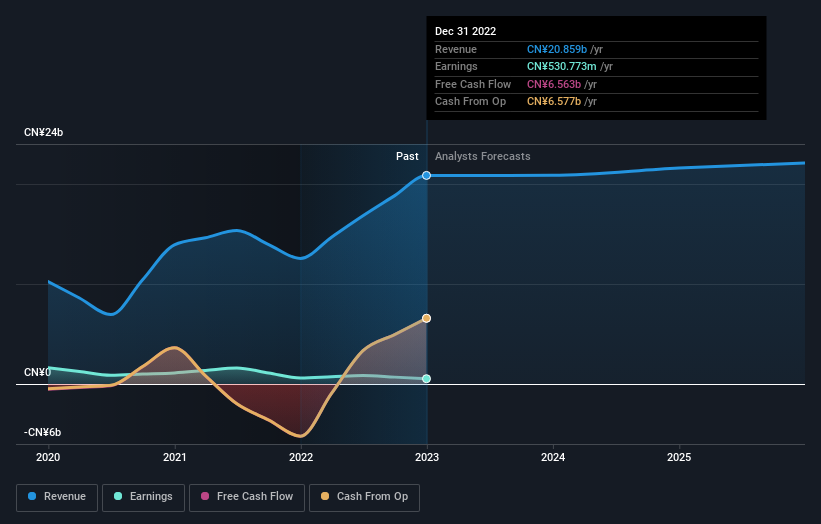- Hong Kong
- /
- Real Estate
- /
- SEHK:207
At HK$0.29, Is It Time To Put Joy City Property Limited (HKG:207) On Your Watch List?
While Joy City Property Limited (HKG:207) might not be the most widely known stock at the moment, it saw a decent share price growth in the teens level on the SEHK over the last few months. As a small cap stock, hardly covered by any analysts, there is generally more of an opportunity for mispricing as there is less activity to push the stock closer to fair value. Is there still an opportunity here to buy? Let’s examine Joy City Property’s valuation and outlook in more detail to determine if there’s still a bargain opportunity.
See our latest analysis for Joy City Property
What's The Opportunity In Joy City Property?
According to my valuation model, the stock is currently overvalued by about 25%, trading at HK$0.29 compared to my intrinsic value of HK$0.24. This means that the buying opportunity has probably disappeared for now. Furthermore, Joy City Property’s share price also seems relatively stable compared to the rest of the market, as indicated by its low beta. If you believe the share price should eventually reach its true value, a low beta could suggest it is unlikely to rapidly do so anytime soon, and once it’s there, it may be hard to fall back down into an attractive buying range.
What does the future of Joy City Property look like?

Future outlook is an important aspect when you’re looking at buying a stock, especially if you are an investor looking for growth in your portfolio. Although value investors would argue that it’s the intrinsic value relative to the price that matter the most, a more compelling investment thesis would be high growth potential at a cheap price. However, with a relatively muted revenue growth of 6.0% expected over the next couple of years, growth doesn’t seem like a key driver for a buy decision for Joy City Property, at least in the short term.
What This Means For You
Are you a shareholder? It seems like the market has well and truly priced in 207’s future outlook, with shares trading above its fair value. At this current price, shareholders may be asking a different question – should I sell? If you believe 207 should trade below its current price, selling high and buying it back up again when its price falls towards its real value can be profitable. But before you make this decision, take a look at whether its fundamentals have changed.
Are you a potential investor? If you’ve been keeping tabs on 207 for some time, now may not be the best time to enter into the stock. The price has surpassed its true value, which means there’s no upside from mispricing. However, the positive outlook means it’s worth diving deeper into other factors in order to take advantage of the next price drop.
So while earnings quality is important, it's equally important to consider the risks facing Joy City Property at this point in time. For instance, we've identified 5 warning signs for Joy City Property (2 are significant) you should be familiar with.
If you are no longer interested in Joy City Property, you can use our free platform to see our list of over 50 other stocks with a high growth potential.
New: Manage All Your Stock Portfolios in One Place
We've created the ultimate portfolio companion for stock investors, and it's free.
• Connect an unlimited number of Portfolios and see your total in one currency
• Be alerted to new Warning Signs or Risks via email or mobile
• Track the Fair Value of your stocks
Have feedback on this article? Concerned about the content? Get in touch with us directly. Alternatively, email editorial-team (at) simplywallst.com.
This article by Simply Wall St is general in nature. We provide commentary based on historical data and analyst forecasts only using an unbiased methodology and our articles are not intended to be financial advice. It does not constitute a recommendation to buy or sell any stock, and does not take account of your objectives, or your financial situation. We aim to bring you long-term focused analysis driven by fundamental data. Note that our analysis may not factor in the latest price-sensitive company announcements or qualitative material. Simply Wall St has no position in any stocks mentioned.
About SEHK:207
Joy City Property
An investment holding company, engages in real estate business in Mainland China and Hong Kong.
Good value with mediocre balance sheet.
Market Insights
Community Narratives


Recently Updated Narratives

Astor Enerji will surge with a fair value of $140.43 in the next 3 years

Proximus: The State-Backed Backup Plan with 7% Gross Yield and 15% Currency Upside.


A case for for IMPACT Silver Corp (TSXV:IPT) to reach USD $4.52 (CAD $6.16) in 2026 (23 bagger in 1 year) and USD $5.76 (CAD $7.89) by 2030
Popular Narratives


MicroVision will explode future revenue by 380.37% with a vision towards success


The company that turned a verb into a global necessity and basically runs the modern internet, digital ads, smartphones, maps, and AI.



